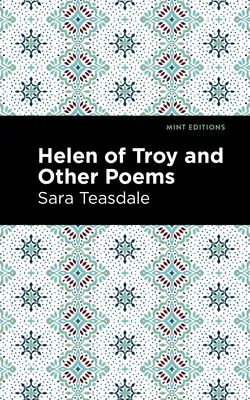Helen of Troy and Other Poems (1911) is a poetry collection by Sara
Teasdale. The poet's second collection, published several years before
she was awarded the 1918 Pulitzer Prize, is a masterful collection of
lyric poems meditating on life, romance, and the natural world. Somber
and celebratory, symbolic and grounded in experience, Helen of Troy and
Other Poems revels in the mystery of existence itself. "Wild flight on
flight against the fading dawn / The flames' red wings soar upward
duskily. / This is the funeral pyre and Troy is dead / That sparkled so
the day I saw it first, / And darkened slowly after. I am she / Who
loves all beauty-yet I wither it." As Troy burns, Teasdale imagines an
impassioned monologue given from the ramparts by the infamous Helen,
whose faithlessness in marriage was the catalyst for war in Homer's
Iliad. Although she is often seen as a minor character, more an object
of male desire than an autonomous subject in her own right, Teasdale
refuses to follow the template passed down by generations of
poets-mostly men. Her Helen is meditative and intelligent, capable of
immense sorrow and full-throated rage alike: "Men's lives shall waste
with longing after me, / For I shall be the sum of their desire, / The
whole of beauty, never seen again." While acknowledging her role in
Troy's destruction, Helen is a tragic figure in Teasdale's poem, a woman
who never asked for beauty, let alone for the troubles that beauty
brought down on the world. Containing monologue poems from such figures
as Sappho, Beatrice, and Guenevere, alongside a series of love poems and
finely-crafted sonnets, Helen of Troy and Other Poems is a brilliant
collection by a gifted American poet. With a beautifully designed cover
and professionally typeset manuscript, this edition of Sara Teasdale's
Helen of Troy and Other Poems is a classic work of American poetry
reimagined for modern readers.


